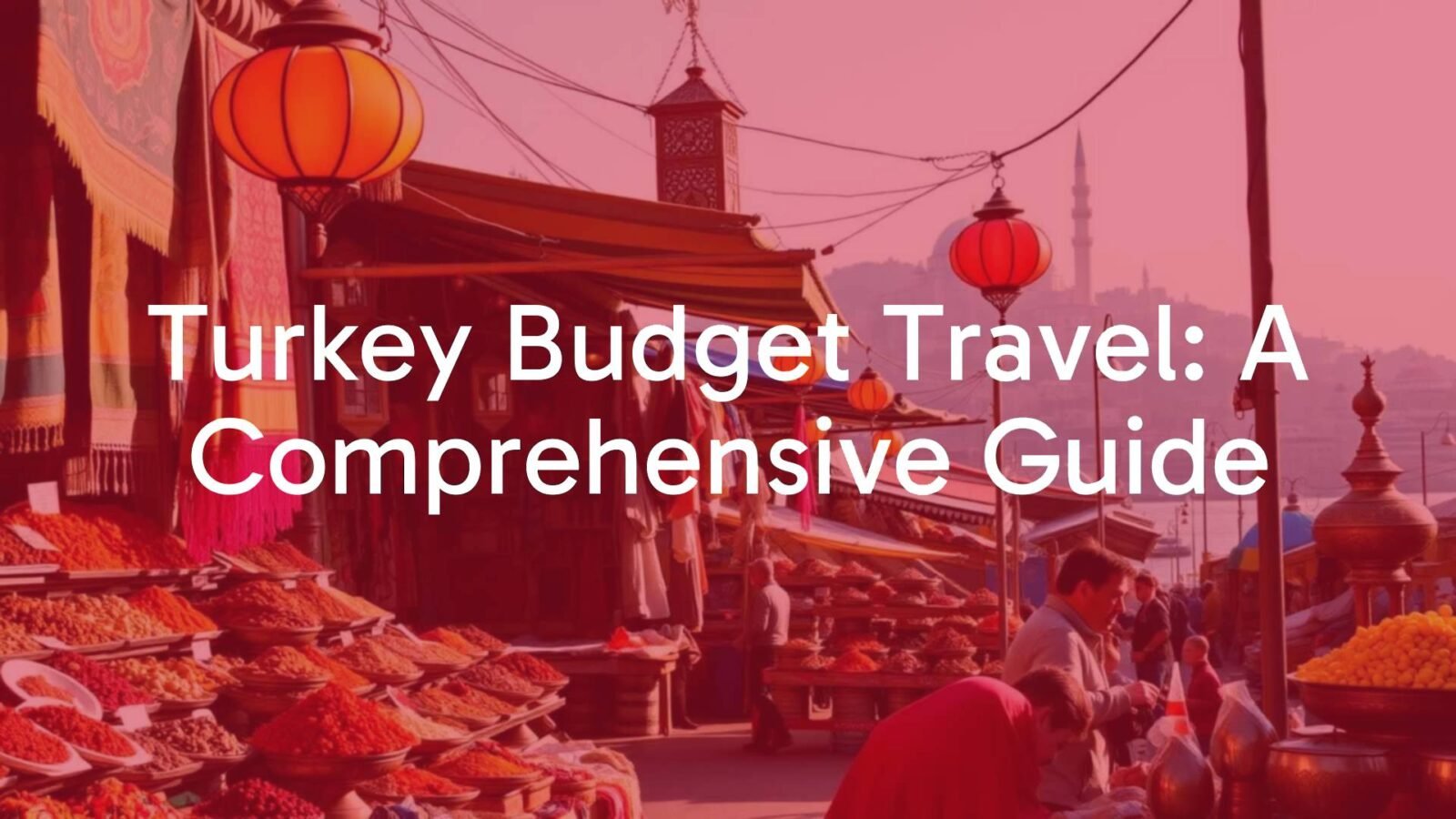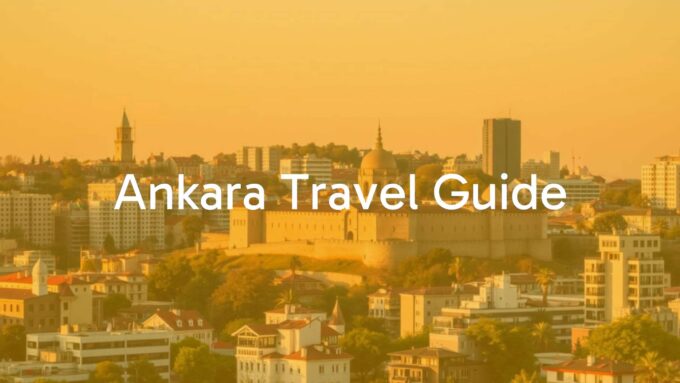Planning a trip to Turkey on a budget is possible and very rewarding. This beautiful country mixes history, culture, and amazing scenery, and you can enjoy a lot without spending much. From lively bazaars in Istanbul to the rock formations of Cappadocia and the clear waters along the Mediterranean and Aegean coasts, Turkey offers great value if you plan well and follow a few simple tips.
Prices have risen in recent years and inflation is still a factor, but the Turkish Lira often trades at a rate that gives visitors strong buying power. This guide explains how to travel Turkey cheaply, so you can have a memorable trip that fits your wallet.
Why Turkey Appeals to Budget Travelers
Turkey is often listed as a budget-friendly destination. You get ancient sites, lively cities, and striking nature at prices far below many places in Western Europe. The mix of culture and cost makes it a great choice for travelers who want to see and do more without overspending.
Is Turkey a Cheap Travel Destination?
Yes, Turkey is generally affordable, especially for travelers watching their spending. It may not always be as cheap as some parts of Eastern Europe, but it is much cheaper than Western Europe or North America. The best savings come from smart planning and following local habits for food and transport.
Costs change based on your travel style. A budget traveler might spend about $30-$50 per day (not counting a room), while a mid-range traveler might spend $70-$120 per day. Even higher-end options often cost less here than in many other countries.
What Makes Travel in Turkey Affordable?
The exchange rate for the Lira often favors visitors using USD or Euros, which means your money goes further. Daily costs like food and local transport are lower than in many Western countries. Street food and small local restaurants serve tasty meals at low prices.
Turkey also has wide, low-cost public transport, so city travel and trips between regions are easy on the budget. You can find everything from cheap hostels and guesthouses to reasonably priced small hotels, especially outside peak season and away from main tourist areas. Many sights-mosques, viewpoints, and public spaces-are free or low-cost, which helps keep daily expenses down.
Myths and Realities About Budget Travel in Turkey
Some people think traveling on a budget in Turkey means less comfort or fewer real experiences. In fact, staying in small guesthouses, eating at lokantas, and using public transport often leads to more personal, local moments than sticking to touristy spots.
Inflation is real, and Lira prices can change. Add a small buffer to your budget and expect some fluctuation. Also, a few big-ticket activities, like hot air balloon rides in Cappadocia, are pricey. Choose what matters most to you and plan your splurges.
When to Plan Your Budget Trip to Turkey
Timing can make a big difference. Peak season (June-August) brings higher prices for flights, rooms, and tours. To save money and avoid crowds, go in shoulder or low season.
Choosing Off-Peak Seasons for Lower Prices
The cheapest months are usually November through March. You’ll find the lowest prices for flights and stays. Coastal areas are cooler then, but Istanbul stays lively, and Cappadocia under light snow is a special sight with fewer people.
If you want mild weather without peak prices, pick late spring (April-May) or early fall (September-November). May and September are especially good for pleasant weather, smaller crowds, and better deals on rooms.

Benefits of Traveling Outside High Season
You’ll spend less and face fewer crowds, which means a calmer visit to busy sights. Weather in the shoulder months is easier for walking and outdoor plans, and locals often have more time to chat. Even in winter, places like Antalya and Izmir are mild, making them nice for a simple, low-cost break.
How to Find Cheap Flights to and Within Turkey
Flights can be a big cost, but good deals exist. With smart tools and timing, you can cut both international and domestic flight prices.
Tips for Booking the Cheapest Airfare
Book early to catch lower fares. Use tools like Skyscanner or Google Flights to compare prices, set alerts, and see the cheapest dates across a month. Be flexible with days-mid-week flights (Tuesday/Wednesday) and shoulder seasons often cost less.
From Europe or the Middle East, budget airlines often fly direct. From North America, you can find direct flights from hubs like New York, Los Angeles, and Toronto, and shoulder-season round trips can be around $500. From Oceania, expect a layover, often in Southeast Asia or the Middle East, with round trips around $1000. Sites like Secret Flying can help you spot standout deals.
Using Budget Airlines and Alternative Airports
Consider low-cost carriers for international legs and domestic routes. Pegasus and SunExpress often have low fares, but watch for extra fees for bags, seats, and meals. Turkish Airlines and Anadolu Jet also fly domestic routes, sometimes at higher prices but with a smoother onboard experience.
It can be cheaper to fly into big hubs like Istanbul or Ankara, then grab a domestic flight to your final stop. For Cappadocia, Kayseri is usually the cheapest airport, about 90 minutes by plane from Istanbul and often around €50 each way, versus a 10-hour bus for €30-40. Compare time and money before choosing bus vs. flight for long distances.
What Accommodation Options Save You Money in Turkey?
Rooms can take a big slice of your budget, but Turkey has many low-cost choices. From hostels to small guesthouses and local rentals, you can sleep well without spending a lot.
Hostels and Guesthouses for Budget Travelers
Hostels are a solid money-saver across Turkey, in cities, towns, and beach spots. Many offer private rooms as well as dorms. A dorm bed in Istanbul or other cities often costs $18-25 per night. Private hostel rooms usually run $50-75 for a clean, simple room in a good area. These prices are well below many Western European rates.
Family-run guesthouses are another good option. They often include warm hospitality and breakfast. Budget places often start around $50 a night. Check HostelWorld and Booking.com to find the cheapest picks.
How to Find Free or Discounted Accommodation
Couchsurfing offers free stays and a chance to live like a local. Housesitting gives you a free place to stay in exchange for looking after a home or pets; Trusted Housesitters is a popular site. WWOOF and WorkAway swap your help for room and meals, which is great for longer trips.
Camping is also cheap and fun, especially along the coast near Oludeniz or Antalya, where views are hard to beat.
Booking Sites and Local Recommendations
Budget boutique hotels and Airbnb-style rentals can be great for longer stays or groups, and many include kitchens to cut food costs. Staying a bit outside tourist hot spots often saves money. In Istanbul, try neighborhoods a few metro or tram stops from Sultanahmet for better prices.
Book ahead if you plan to visit between June and August, because rooms fill fast and prices climb. Outside summer, you may find better last-minute deals, even same-day.
Getting Around Turkey: Transportation for Budget Travelers
Turkey is easy and cheap to move around. Cities have good public transport, and long-distance options are affordable.
Using Public Transportation
Istanbul, Izmir, and Ankara have simple, low-cost metro, tram, and bus systems. In Istanbul, buy an Istanbulkart for about $2.50. It gives big discounts on metro, trams, buses, and ferries. Top it up at stations and kiosks and use it across the city.
Between towns and within regions, dolmuşes (minibuses) are common and cheap. They run often, cost less than taxis, and cover many local routes. Look for the blue-and-white “D” signs. Rides usually cost $0.10-$0.60, based on distance.
Intercity Buses and Trains: Best Value Routes
For longer trips, intercity buses are the main choice. They’re comfortable, usually air-conditioned, and often include Wi-Fi. Companies like Pamukkale, Metro, and Kamil Koc serve most routes. Istanbul to Izmir takes 8-10 hours and costs just under $20. Trains cover fewer routes but can be a scenic, low-cost option if you aren’t in a rush.
Affordable Internal Flights
Domestic flights can save time on long routes. With Pegasus or SunExpress, one-way tickets between big cities often run $35-$85 if you book early. A 90-minute flight from Istanbul to Cappadocia beats a 12-hour bus and can be similar in price if you catch a deal. Always compare flight prices against bus times and fares.
Taxis, Ride Shares, and When to Avoid Private Transfers
Taxis are handy but cost more. In cities, use an app like BiTaksi to get a metered fare and avoid scams. If you can’t use an app, agree on the price before the ride. For airport trips, public buses like Havas/HavaIst are much cheaper than private transfers. For example, a dolmuş from Marmaris to Icmeler is 10 Lira, while the same trip by taxi is around 130 Lira.
Tips for Getting Around Major Cities on a Budget
Walk when you can; it’s free and a great way to see daily life. Use city transport cards for longer hops. Some cities offer discount cards that bundle museum entries and transport. If you stay outside the tourist center to save on lodging, pick an area well served by public transport to avoid taxi costs.
How to Eat Well on a Budget in Turkey
Turkish food is famous and very affordable, especially away from tourist zones. Eating where locals eat is both tasty and cheap.
Eating Like a Local: Restaurants and Street Food
Look for family-run lokantas with home-style dishes. You can often point to what you want at the counter, and prices are low.
Street food is filling and cheap: döner kebab ($3.50), simit, kumpir, and börek are easy to find. In Istanbul, try balik ekmek (grilled fish sandwich) for about $2.50. A full Turkish breakfast can be $11-14 for a big spread or $5-7 for a smaller one, with bread, olives, meats, tomatoes, feta, honey, and tea. Menemen (eggs with vegetables) costs $3-5. Pide runs $2-3, kebabs and kofte $4-6, and meze plates $5-7 per person to share.

Shopping at Markets and Cooking Your Own Meals
If your place has a kitchen, cook some meals. Weekly markets (pazar) sell fresh fruit, vegetables, cheese, and olives at low prices. Many travelers eat a large breakfast, then just a snack or fruit for lunch to keep costs down.
Average Food Prices and Meal Types
Expect $5-14 for breakfast, $2-5 for items like simit or döner, $7-12 for a local sit-down meal, and $30-55 for a mid-range dinner for two without alcohol. Drinks are cheap: Turkish tea is usually under $1, coffee $2-3, and bottled water under $0.50. Alcohol is taxed heavily, so prices are higher: a beer like Efes costs $3-5 in a bar, cocktails around $6. Tap water isn’t safe to drink everywhere, so plan for bottled water or bring a purifier.
Budget-Friendly Activities and Attractions in Turkey
Turkey has many low-cost or free things to see and do. While some major sights charge more than before, planning and choosing local experiences can keep your activity costs low.
Free and Low-Cost Attractions
In Istanbul, enjoy free walks across Galata Bridge, down Istiklal Street, and around Taksim Square. Visit the New Mosque and the Spice Bazaar, and step inside the Blue Mosque for free. The Grand Bazaar is free to enter and fun for window shopping. You can also see the Obelisk of Theodosius, Arasta Bazaar, Sultanahmet’s streets, the colorful lanes of Balat and Fener, St. Stephen’s Orthodox Church, and Gulhane Park. Take a ferry to Üsküdar or Kadıköy for a free change of scene.
Outside Istanbul, many ruins and nature spots are free or cheap. The coasts have plenty of free beaches. Wandering local markets and neighborhoods costs nothing and adds a lot to your trip.
Using Passes and Discounts for Museums
Big sights can add up (Hagia Sophia €30, Topkapi €60, Basilica Cistern €25). City passes can cut costs. An Istanbul museum pass gives free entry to many places and beats paying each fee separately. The Museum Pass Türkiye (€165) covers 300+ state-run museums and sites for 15 days, which is great for longer trips. Bring student or senior IDs for extra discounts.
Popular Day Trips That Won’t Break the Bank
Take a public ferry for a low-cost Bosphorus cruise with classic views. Day trips to Pamukkale from nearby towns like Bodrum can start around $75. In Cappadocia, a balloon ride costs $260+ and is a splurge, but hiking among the rock formations and visiting cave homes is mostly free or cheap.
For tours, local street operators usually have better prices than hotel desks. Sites like Get Your Guide help you compare options.
How to Manage Money and Payments While Traveling in Turkey
Handling money is simple with a few smart steps. You can avoid extra fees and hassles by using the right methods.
Currency Exchange and ATMs
Turkey uses the Turkish Lira (TRY). Avoid changing money before you arrive or at airports, where rates are worse. Use reputable exchange offices in town and check rates. Make sure they don’t add a commission.
ATMs are common. Your bank card may incur a fee at Turkish ATMs (often up to 100 Lira or about 5 Euros). Ask your bank about foreign withdrawal fees before you go.
Is It Better to Use Cash or Cards?
Carry cash (Lira) for small buys, street food, markets, and tips. Many small places prefer cash. Keep small notes handy.
Cards are widely accepted at hotels and larger restaurants. When paying by card, choose to be charged in TRY, not your home currency, to avoid bad exchange rates and extra fees. A Visa debit card often gives fair rates in larger bars and restaurants and reduces how much cash you need to carry.
Tipping and Payment Etiquette
Tipping is common and appreciated. In restaurants and cafes, 5-10% in cash is standard if service is good, unless a service fee (“servis ücreti”) is already on the bill. Tip hotel porters a few dollars. For a great tour guide, $10-15 per person for a full day is fair.
With taxis, you don’t need a set tip; just round up and say “üstü kalsın” (keep the change). Haggling is normal in markets and bazaars but not in modern stores or places with posted prices.
What Miscellaneous Travel Expenses Should You Expect?
Small costs add up. Knowing them ahead of time helps you stay on budget.
Travel Insurance for Budget Travelers
Travel insurance is a must, even on a tight budget. It gives an important safety net for flight problems, lost bags, medical needs, or emergency trips home. A good one-week policy often costs $30-$70. SafetyWing is a popular choice with worldwide coverage, options after you leave home, and COVID-19 coverage. Don’t skip it-if you can’t afford insurance, you can’t afford the risk.
Shopping Tips: Local Markets and Bargaining
Shopping in Turkey is fun, especially in bazaars like Istanbul’s Grand Bazaar. For better prices, shop at local markets (pazar) for souvenirs, textiles, jewelry, and pottery rather than tourist shops. Haggling is normal and can save you 15-30%. Skip haggling in modern stores or anywhere with clear price tags.
Choose local products over imports for lower prices and better quality. Be careful with “Buy-One-Get-One-Free” alcohol deals in resort areas; drinks can be watered down. Go for local drinks like Efes beer for better value.
Unexpected Costs to Watch For
Plan a small budget for bottled water, or bring a GRAYL purifier to save money and reduce plastic. If you use an overseas bank card, watch for ATM fees and your bank’s conversion charges. If you rent a car, add fuel (about $2.50/liter or $9.25/gallon) and road tolls to your budget.
Thinking of a yacht trip? A bareboat charter can start around €800 per week if you can sail. A skipper adds about €200 per day. Also check visa rules early. Many travelers pay $50-$80 for an e-Visa, depending on nationality. Use the official Republic of Türkiye e-Visa website to avoid extra fees on third-party sites.
Smart Strategies for Saving More on Your Turkey Trip
Beyond the basics, a few extra habits can lower your costs even more.
Booking in Advance-When It Pays Off
Booking early usually helps for international flights and popular rooms during June-August. Prices rise as demand grows. For domestic flights, you often have more flexibility and can book just days ahead without big price jumps. Outside summer, you may be fine booking rooms closer to your dates.
Using Discounts, City Passes, and Group Tours
Museum and city passes are great money-savers. In Istanbul, a museum pass covers many key sites and can pair with cheaper transport options. Visiting several regions? The Museum Pass Türkiye (€165) gives access to 300+ state museums and sites for 15 days. Small group tours often offer better value and helpful context at historic places. Local operators usually charge less than hotel desks or big international agencies.
Packing Tips to Avoid Extra Costs
Pack smart to avoid fees and losses. A dry bag protects phones and cameras on boat trips. Don’t overpack, since budget airlines charge for heavy bags. Bring a reusable bottle and a purifier to cut bottled water costs. Pack modest clothing for mosque visits so you don’t have to buy cover-ups.
Sample Turkey Travel Budgets: Real Cost Breakdowns
Here are sample daily costs. Prices can change with inflation and exchange rates.
Short Trip vs. Extended Stay Cost Examples
On a 7-day trip, a budget traveler might aim for $40-60 per day (not counting international flights). That covers a hostel bed ($18-25), street food or simple restaurants ($10-20), public transport ($5-10), and a few low-cost activities ($10-15). Longer stays can lower costs further with housesitting or WWOOF/WorkAway, which reduce room and food spending.
Example mid-range day: $121.50 total, with Accommodation (shared) $54.50, Transport $8, Food $32, Activities $26. This is a comfortable mid-range pace.
Budget vs. Mid-Range vs. Luxury: Side-by-Side Comparison
- Budget Traveler ($40-60 per day):
- Accommodation: Hostel dorm ($18-25/night), basic guesthouse ($30-50/night).
- Food: Street food, lokantas, some cooking ($10-20/day).
- Transportation: Public transport (Istanbulkart, dolmuş), intercity buses ($5-10/day).
- Activities: Free sights, low-cost museums, public ferries ($5-15/day).
- Example: 7 days: about $280-$420 (not including international flights).
- Mid-Range Traveler ($70-120 per day):
- Accommodation: Private hostel room or guesthouse ($50-75/night), 3-star hotel ($40-130/night).
- Food: Mix of local and mid-range restaurants, occasional treat ($30-50/day).
- Transportation: Public transport, some taxis/ride-shares, a domestic flight for long legs ($15-25/day).
- Activities: Several paid sights, a guided tour, or a day trip ($20-40/day).
- Example: 7 days: about $490-$840 (not including international flights).
- Luxury Traveler ($200+ per day):
- Accommodation: 4-star hotel ($100-200/night), boutique/Cappadocia cave hotel ($90-250/night), 5-star hotel ($250-350/night).
- Food: Higher-end dining with drinks ($70-100+/day).
- Transportation: Private transfers, domestic flights, rental cars ($30-50+/day).
- Activities: Cappadocia balloon ($260), guided tours, VIP beach clubs ($50-100+/day).
- Example: 7 days: about $1,400+ (not including international flights).
These are estimates for one person and do not include international flights or travel insurance. Adjust to your own style and the places you plan to visit.
Frequently Asked Questions About Budget Travel in Turkey
Is Turkey Safe for Solo and Budget Travelers?
Turkey is generally safe for solo and budget travelers. Use common sense: stay in well-lit areas at night, keep an eye on your things, and learn a few basic Turkish phrases. Solo women may prefer modest dress in conservative areas and can look up area-specific tips. Respect local customs and you’ll likely find warm hospitality.
Can You Travel Turkey on $30 a Day?
$30 a day is tight but possible for very frugal travelers. You’ll need hostel dorms or free stays like Couchsurfing, street food and home-cooked meals from markets, public transport only, and mostly free activities. You’ll skip many paid sights and tours. It’s tough, but Turkey’s low costs make it more realistic outside tourist centers and in low season.
Which Turkish Destinations Are the Most Affordable?
Istanbul and Cappadocia are amazing but can be pricier, especially for attractions. Go beyond the big names to save more. Smaller towns in the east are usually cheaper for rooms, food, and activities. Even in popular regions, staying in less central neighborhoods or nearby towns can cut costs a lot. Coastal areas outside July and August are also good value. Eat and stay where locals do for the best prices.















Leave a comment